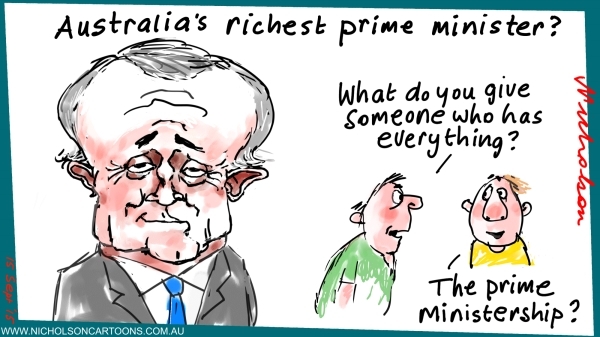Search
Democracy Links
Member's Off-site Blogs
a fool's errand ...

from Crikey …
For all the talk yesterday of Prime Minister Malcolm Turnbull's state income tax proposal representing a major reform to the federation, it's hard to see it as anything other than a political solution to a political problem.
State income taxes are now the sixth significant reform idea floated by the government in the course of the tax debate since Turnbull replaced Tony Abbott and Scott Morrison replaced Joe Hockey. We spent longest on lifting the GST, until that was abandoned in January. Cutting personal income taxes was dropped soon after due to a lack of money to pay for it. Curbing the "excesses" of negative gearing was also abandoned because it would get in the way of an Abbottesque scare campaign against Labor. Company tax cuts were floated as drivers of investment and growth, despite the lack of any evidence from anywhere in the world for that. Curbing the cost of superannuation tax concessions remains on the table but is in the sights of Turnbull and Morrison's right-wing enemies within the party.
And each time an option was abandoned, the government looked more directionless, and Morrison was left looking more silly, given he'd been the one making the running on each of the ideas. Being spruiked by Morrison began to resemble the kiss of political death for a reform.
Appropriately, yesterday, it worked the other way - Turnbull boldly announced his interest in state income tax, only for Morrison to undercut the whole idea shortly afterwards, denying his Prime Minister had opened the way for the states to lift income taxes themselves, despite Turnbull saying exactly that. Perhaps the Treasurer wanted his leader to know what it felt like to make the running on a reform idea and not get any back-up. Or perhaps his office simply isn't on the PMO's transcript distribution list.
After all of last week's discussion of Morrison not being in Turnbull's charmed circle over when the budget would actually be delivered, after Turnbull went to the trouble of advertising that he spent Easter Monday at home in Sydney with Morrison, it beggars belief that the Prime Minister and the Treasurer should have failed so spectacularly to co-ordinate such a significant announcement. But there it is.
The economic benefits of a state income tax are fairly esoteric: "competitive federalism" might drive greater state efficiency at service delivery and tax rates in the long run. And some of those benefits will be lost in making sure the system doesn't smash the South Australia and Tasmanian economies. The benefits might also be swamped by an interstate race to the bottom on tax and services (recall, if you're old enough, how Joh Bjelke-Petersen drove the end of death duties, a highly efficient form of savings tax, in other states by ending them in Queensland).
But the costs are overstated as well. Critics are already warning of nine different tax regimes and the possibilities for avoidance and increased compliance costs. Undoubtedly there will be good opportunities for gaming a system in which different tax rates apply depending on your domicile, and high-income earners will, as always, be better placed to take advantage of this new version of State of Origin. But assuming the Australian Tax Office remains the single tax collector and no additional paperwork is required from taxpayers, the costs aren't likely to be too high. And those people borrowing Tony Abbott's silly phrase "double taxation" have to explain how, exactly, they're being taxed twice.
Even assuming any benefits, however, state income taxes are still primarily about addressing the political problem of who is accountable for service delivery. Everyone can recite the cliche of the "blame game" (it was Kevin Rudd, back in 2007, who first ran a campaign on "ending the blame game" on health). Turnbull went to great lengths yesterday to emphasise how state income tax would end "this depressing blame game". "This," said Turnbull, "is the only way that we can genuinely reform our federation."
Except that the GST was supposed to address exactly this issue - in 1998 John Howard promised the GST would "guarantee the revenue we need to support the health, education, police and other services so important for a fair society". Now, instead, another "growth tax" is needed to again guarantee the revenue we need to support health and education.
Moreover, the GST didn't stop the Howard government from dramatically escalating its funding for private schools, from $2.9 billion in 2000 to $6.2 billion in 2007, nearly twice as much as for public schools. This morning, the Prime Minister flagged that the government would continue to fund private schools while handing responsibility for public schools back to the states. A state income tax thus won't magically erase politics from health and education - two of the most important issues in shaping how people vote. Rather, it will simply adjust the framework within which it is played out.
State income taxes would probably deliver some modest long-term economic efficiency benefits, but they may not even be as large as the modest efficiency benefits of the now-ruled-out expansion of the GST. Instead, the idea is a political idea, from a government that is increasingly desperate to address the political problem that it lacks a tax reform policy worth the name.
- By John Richardson at 31 Mar 2016 - 4:26pm
- John Richardson's blog
- Login or register to post comments
Recent comments
7 hours 48 min ago
8 hours 2 min ago
18 hours 48 min ago
1 day 24 min ago
1 day 3 hours ago
1 day 5 hours ago
1 day 5 hours ago
1 day 6 hours ago
1 day 7 hours ago
1 day 7 hours ago